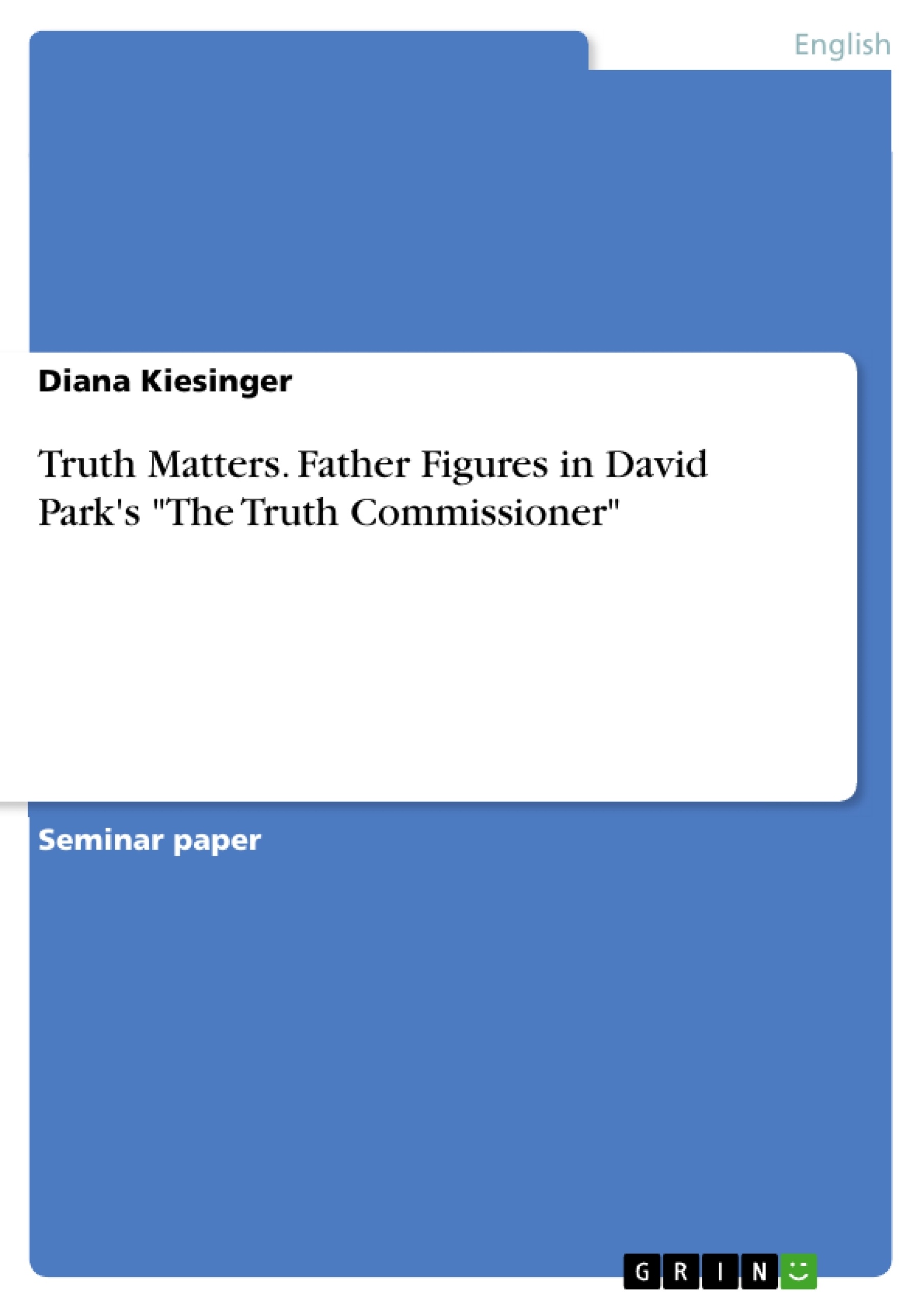David Park's novel "The Truth Commissioner" is acclaimed to be an outstanding story about the making up of a Truth and Reconciliation Commission that has never and probably will
never take place in the war-torn country of Northern Ireland. It therefore is entirely fictitious but it orientates on similar proceedings in South Africa or Chile. Since the novel is not only dealing with political issues it focuses rather on the narration of four main characters who apparently have nothing in common. But when taking a closer look upon these four foundation pillars, each of them is
a father figure in his own way. Fatherhood is undoubtedly a big issue in the book considering how different all four men live with the consciousness of being a father, being a father soon or never being a father at all. Thereupon, this paper makes an attempt to elaborate, evaluate and compare all four characters and their father-child-relations.
Inhaltsverzeichnis (Table of Contents)
- Introduction
- Situations
- Henry Stanfield - The Spurned Father
- Francis Gilroy - The Concerned Father
- James Fenton - The Childless Father
- Danny The Father-To-Be
- Solutions
Zielsetzung und Themenschwerpunkte (Objectives and Key Themes)
This paper aims to analyze and compare the four main characters in David Park's novel, The Truth Commissioner, focusing on their father-child relations. It explores how they grapple with their pasts and present situations, highlighting the complex dynamics within each family unit. The paper also investigates how these characters are interwoven through the case of a murdered child.
- Fatherhood as a central theme in the novel
- The complexities of family relationships and their impact on individual lives
- The influence of past trauma and brokenness on present actions and choices
- The search for connection and belonging in the face of loss and alienation
- The role of the Truth Commission in addressing past conflicts and achieving reconciliation
Zusammenfassung der Kapitel (Chapter Summaries)
- Introduction: The introduction provides an overview of David Park's novel, The Truth Commissioner, and its exploration of father-child relations. It highlights the significance of the four main characters and their individual struggles with fatherhood.
- Henry Stanfield - The Spurned Father: This chapter focuses on Henry Stanfield, a member of the Truth Commission who is grappling with his estranged relationship with his daughter, Emma. The narrative explores his longing for connection and his attempts to reconcile with his past through various means, including daydreams about his colleague, Laura, and seeking solace in a prostitute. Stanfield's internal conflicts and his attempts to escape the consequences of his actions are central to this chapter.
- Francis Gilroy - The Concerned Father: The chapter centers on Francis Gilroy, the Minister for Children and Culture, who is struggling with the aging process and his daughter's impending wedding. It delves into his anxieties about his declining health and his fear of losing his daughter. The chapter highlights the emotional turmoil associated with letting go of a child and the changing dynamics of father-daughter relationships.
- James Fenton - The Childless Father: This chapter explores the story of James Fenton, a man who has never been a father. It delves into his complex feelings about fatherhood and his struggle with infertility. This chapter examines the themes of longing, regret, and the search for fulfillment in the absence of children.
- Danny The Father-To-Be: This chapter presents Danny, a young man who is about to become a father. The chapter focuses on his hopes and anxieties as he prepares for parenthood, highlighting the challenges and rewards of embracing fatherhood.
Schlüsselwörter (Keywords)
This paper explores the themes of fatherhood, family relationships, reconciliation, truth commissions, and the impact of past trauma on present lives. It delves into the psychological motivations of the characters, highlighting their individual struggles with identity, connection, and belonging.
Frequently Asked Questions
What is the central theme of David Park's "The Truth Commissioner"?
The novel explores the themes of fatherhood, family relationships, and the impact of past trauma through the setting of a fictional Truth and Reconciliation Commission in Northern Ireland.
Who are the four main father figures in the story?
The story focuses on Henry Stanfield (the spurned father), Francis Gilroy (the concerned father), James Fenton (the childless father), and Danny (the father-to-be).
How does the Truth Commission connect the characters?
The characters are interwoven through the investigation of a murdered child, which forces them to confront their past actions and their present roles as fathers.
What is the significance of James Fenton's character?
Fenton represents the "childless father," exploring themes of longing, regret, and the search for fulfillment in the absence of biological children.
Is the Truth Commission in the novel based on a real event?
No, it is fictitious, although it is inspired by real-world commissions such as those held in South Africa or Chile after periods of conflict.
- Citation du texte
- Diana Kiesinger (Auteur), 2010, Truth Matters. Father Figures in David Park's "The Truth Commissioner", Munich, GRIN Verlag, https://www.grin.com/document/296331



